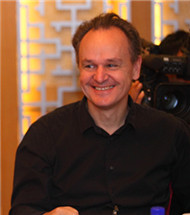An interview with 2014 Technical Committee Member Mr. Eric Huybrechts
Mr. Eric Huybrechts has served on the Technical Committee back in 2014. He is responsible for International Affairs at the Regional planning agency of Paris/Ile de France region (IAU-IDF). Recently, Guangzhou Award Secretariat had an interview with him. Here is what we have discussed.

In the previous cycle of Guangzhou Award where you served as a jury member, which initiative impressed you most the why?
Christchurch with its inclusive process for innovation for rebuilding after the earthquake.
The Guangzhou Award is a platform for sharing innovative experiences in urban development between cities and regions. How do you think the Guangzhou Award can help further communication and exchange of knowledge, expertise and experience between cities and regions?
Guangzhou award could propose
- Guidelines based on their identification of urban innovation: publication, videos, MOOC
- Labs to support cities in preparing innovative project
- Task force to support cities with high level expertise to inspire innovation on complex issues
- Researches and prospects for future changes in urban contexts
- Connect with innovation awards (i.e.: France Biodiversity Award managed by Institut Paris Region….) and networks (Urbact/European union) the create a global database on urban innovation.
In your opinion, how can urban innovation better integrate with the Global Agenda and more specifically the SDGs and the NUA?
Innovation awards could be clearly in line (referring to) with the UN-Habitat Strategic framework (2020-2024) and with its Urban Labs dedicated to experiment innovation.
Urban innovation is mainly experiment by cities, inhabitants and private companies. They don’t wait for NUA/SDGs to try solutions. SDG/NUA gives a framework with principles. Cities are using this framework to justify their actions.
There are big failure in the NUA that doesn’t consider the effect of finance on cities economy and urban development, and also doesn’t consider informal settlements as a way to produce cities (it represents half of the urban production worldwide). Urban innovation should go further the principles of good design that produce unaffordable housing. It should be at the front line to tackle real challenges of the population, not limited to the international doxa.
As for urban governance, what new trends do you think there will be in the future?
More than half of the urban dwellers are living in metropolitan areas and the rate increase each year. The metropolis is the main feature of the human settlements of the XXIst century. In the same time megapolises are accommodating a larger share of urban dwellers. Metropolitan area management is more complex than municipalities management and needs specific tools: inter-sectoral, inter-territory, inter administrative tiers. But the political and administrative context of each country create specific conditions for innovative solutions that can inspire other cities. The trends is complexity of the governance system of large cities with balance between representativity and efficiency. The role of the State governments are crucial to ease the creation of metropolitan bodies and initiatives, to define levels of devolution (competencies), but cannot replace local capacities.
What’s your expectation for the 5th cycle of Guangzhou Award? Would you like to send some words to the potential participants?
Six thematics could be explored as priorities:
- Health and city planning: how to make cities more resilient to pandemics
- Managing quality of life in high density urban areas and hubs
- Governance of megacities and large city regions
- Planning the megacities: new collaborative tools
- Tools for regulation of the effect of the financialisation of the economy to city development (ghost cities, empty apartments, unaffordable price of real estates…)
- Planning with future informal areas in developing countries


 In Focus | World Cities Day: People-Centred Smart Cities
In Focus | World Cities Day: People-Centred Smart Cities City Stories | Fostering community resilience: A lifeline for the Central African Republic
City Stories | Fostering community resilience: A lifeline for the Central African Republic In Focus | Innovative Education, Empowering Futures
In Focus | Innovative Education, Empowering Futures




















 Tel: +86 020 3780 4434
Tel: +86 020 3780 4434 Email: info@guangzhouaward.org
Email: info@guangzhouaward.org Address: Unit 01-7, 28th Floor, No. 7, Chunrong 3rd Road, Tianhe District, Guangzhou, Guangdong, 510000, PRC
Address: Unit 01-7, 28th Floor, No. 7, Chunrong 3rd Road, Tianhe District, Guangzhou, Guangdong, 510000, PRC




